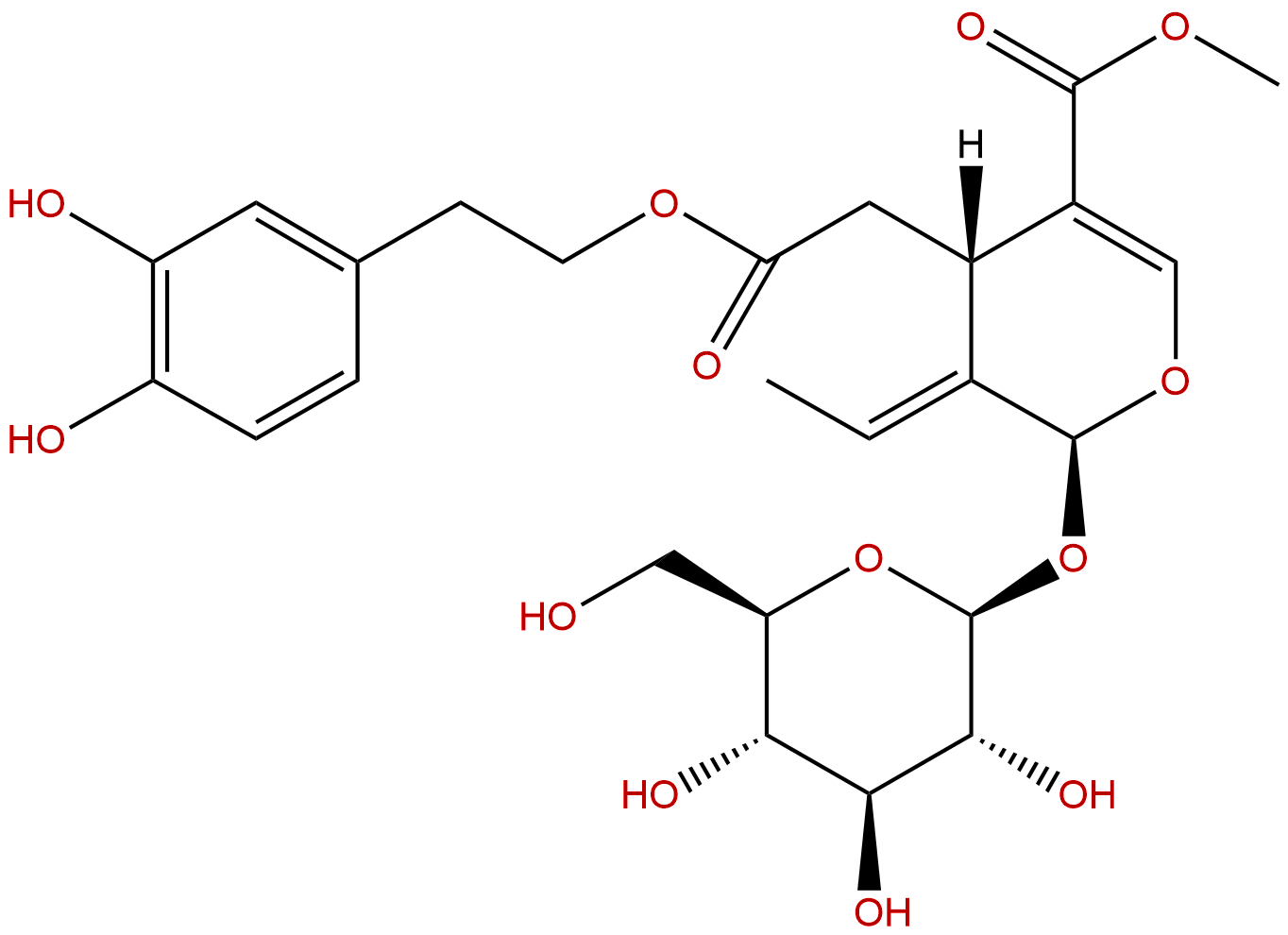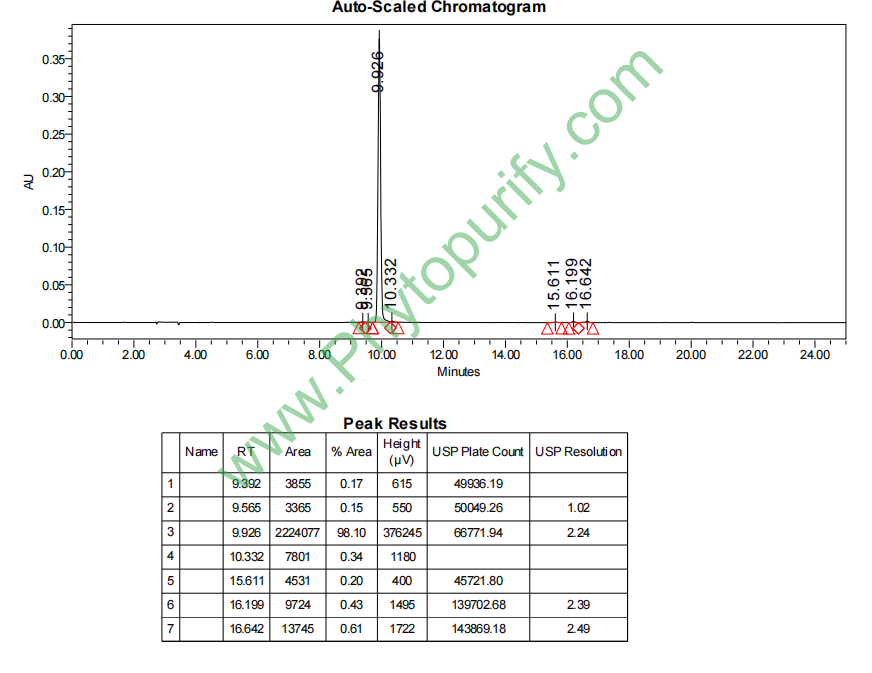
OleuropeinCAS No.:32619-42-4
|
||||||||||
 |
|
|
||||||||

| Catalogue No.: | BP1028 |
| Formula: | C25H32O13 |
| Mol Weight: | 540.518 |
Product name: Oleuropein
Synonym name:
Catalogue No.: BP1028
Cas No.: 32619-42-4
Formula: C25H32O13
Mol Weight: 540.518
Botanical Source: Oliver
Physical Description:
Type of Compound: Iridoids
Purity: 95%~99%
Analysis Method: HPLC-DAD or/and HPLC-ELSD
Identification Method: Mass, NMR
Packing: Brown vial or HDPE plastic bottle
Storage: Store in a well closed container, protected from air and light. Put into refrigerate or freeze for long term storage.
Whenever possible, you should prepare and use solutions on the same day. However, if you need to make up stock solutions in advance, we recommend that you store the solution as aliquots in tightly sealed vials at -20℃. Generally, these will be useable for up to two weeks.
The product could be supplied from milligrams to grams
Inquire for bulk scale.
Description:
Oleuropein exhibits anti-ischemic, antioxidative, hypolipidemic, in vitro antimycoplasmal , anti-inflammatory, and anti-cancer effects., it also may be helpful in the prevention of diabetic complications associated with oxidative stress. Oleuropein prevents oxidative myocardial injury induced by ischemia and reperfusion, and reduces viremia in duck hepatitis B virus (DHBV)-infected ducks. Oleuropein reduces TLR and MAPK signaling.
References:
Mol Med Rep. 2015 Jun;11(6):4617-24.
Oleuropein induces apoptosis via activation of caspases and suppression of phosphatidylinositol 3-kinase/protein kinase B pathway in HepG2 human hepatoma cell line.
Oleuropein is a polyphenol, that is found in extra‑virgin olive oil. Previous studies have shown that Oleuropein inhibits cell proliferation and induces apoptosis in breast cancer, colorectal cancer and thyroid cancer. The aim of the present study was to investigate the effects of Oleuropein in hepatocellular carcinoma (HCC) cells.
METHODS AND RESULTS:
The results of Cell Counting Kit 8 and flow cytometric analysis indicated that Oleuropein effectively inhibited cell viability and induced apoptosis in HepG2 human hepatoma cells in a dose‑dependent manner, through activation of the caspase pathway. Proapoptotic Bcl‑2 family members, BAX and Bcl‑2, were involved in Oleuropein‑induced apoptosis. The phosphatidylinositol 3‑kinase/protein kinase B (PI3K/AKT) signaling pathway was also shown to be involved in this process. Oleuropein was demonstrated to suppress the expression of activated AKT. In addition, AKT overexpression promoted cell survival following treatment with Oleuropein, while inhibition of AKT promoted cell death. Furthermore, the data demonstrated that Oleuropein induces the production of reactive oxygen species (ROS) and that the function of Oleuropein is, at least partially, ROS‑dependent.
CONCLUSIONS:
These results suggest that Oleuropein may be a promising novel chemotherapeutic agent in hepatocellular carcinoma.
Int J Antimicrob Agents. 2002 Oct;20(4):293-6.
In vitro antimycoplasmal activity of oleuropein.
METHODS AND RESULTS:
The activity of Oleuropein, a phenolic glycoside contained in olive oil, was investigated in vitro against Mycoplasma hominis, Mycoplasma fermentans, Mycoplasma pneumoniae and Mycoplasma pirum. Oleuropein inhibited mycoplasmas at concentrations from 20 to 320 mg/l.
CONCLUSIONS:
The MICs of Oleuropein to M. pneumoniae, M. pirum, M. hominis and M. fermentans were 160, 320, 20 and 20 mg/l, respectively.
J Nutr Biochem. 2004 Aug;15(8):461-6.
Oleuropein prevents oxidative myocardial injury induced by ischemia and reperfusion.
The potential protective effects of Oleuropein, a dietary antioxidant of olive oil, has been investigated in the isolated rat heart.
METHODS AND RESULTS:
The organs were subjected to 30 minutes of no-flow global ischemia and then reperfused. At different time intervals, the coronary effluent was collected and assayed for creatine kinase activity as well as for reduced and oxidized glutathione. In addition, the extent of lipid peroxidation was evaluated by measuring thiobarbituric acid reactive substance concentration in cardiac muscle. Pretreatment with 20 microg/g Oleuropein before ischemia resulted in a significant decrease in creatine kinase and reduced glutathione release in the perfusate. The protective effect of Oleuropeinagainst the post-ischemic oxidative burst was investigated by measuring the release, in the coronary effluent, of oxidized glutathione, a sensitive marker of heart's exposure to oxidative stress. Reflow in ischemic hearts was accompanied by a prompt release of oxidized glutathione; in ischemic hearts pretreated with Oleuropein, this release was significantly reduced. Membrane lipid peroxidation was also prevented by Oleuropein. The reported data provide the first experimental evidence of a direct cardioprotective effect of Oleuropein in the acute events that follow coronary occlusion, likely because of its antioxidant properties.
CONCLUSIONS:
This finding strengthens the hypothesis that the nutritional benefit of olive oil in the prevention of coronary heart disease can be also related to the high content of Oleuropein and its derivatives. Moreover, our data, together with the well documented antithrombotic and antiatherogenic activity of olive oil polyphenols, indicate these antioxidants as possible therapeutic tools for the pharmacological treatment of coronary heart disease as well as in the case of cardiac surgery, including transplantation.
J Ethnopharmacol. 2009 Sep 7;125(2):265-8.
Antiviral efficacy against hepatitis B virus replication of oleuropein isolated from Jasminum officinale L. var. grandiflorum.
Jasminum officinale L. var. grandiflorum (JOG) is a folk medicine used for the treatment of hepatitis in south of China. Phytochemical studies showed that secoiridoid glycosides are the typical constituents of this plant. The present study was undertaken to evaluate the effect of Oleuropein (Ole) derived from the flowers of JOG on hepatitis B virus (HBV) replication in HepG2 2.2.15 cell line in vitro and duck hepatitis B virus (DHBV) replication in ducklings in vivo.
METHODS AND RESULTS:
The extracellular hepatitis B e antigen (HBeAg) and hepatitis B surface antigen (HBsAg) concentrations in cell culture medium were determined by ELISA. DHBV in duck serum was analyzed by dot blot. Ole blocks effectively HBsAg secretion in HepG2 2.2.15 cells in a dose-dependent manner (IC(50)=23.2 microg/ml). Ole (80 mg/kg, intraperitoneally, twice daily) also reduced viremia in DHBV-infected ducks.
CONCLUSIONS:
Ole therefore warrants further investigation as a potential therapeutic agent for HBV infection.
HPLC of Oleuropein
